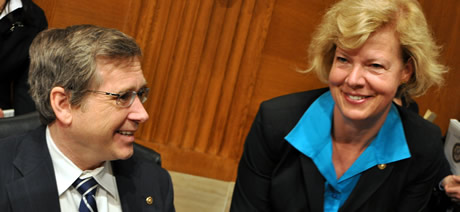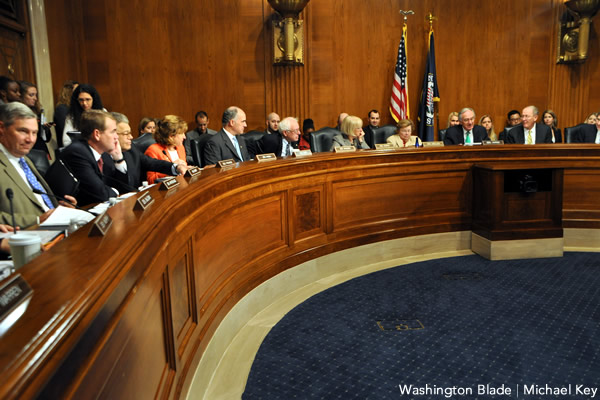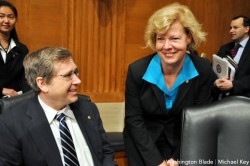Politics
HISTORIC: Senate panel advances trans-inclusive ENDA
In first, committee reports out trans-inclusive LGBT anti-bias bill


Senate Health, Education, Labor & Pensions Committee approved a trans-inclusive ENDA on Wednesday (Washington Blade photo by Michael Key)
A Senate committee made history on Wednesday by approving for the first time a trans-inclusive version of the Employment Non-Discrimination Act and picking up key Republican support from Sens. Orrin Hatch (R-Utah) and Lisa Murkowski (R-Alaska).
Lawmakers on the Senate Health, Education, Labor & Pensions Committee reported out ENDA by a 15-7 vote after a short period of discussion. No amendments were offered except for a manager’s amendment, although Sen. Lamar Alexander (R-Tenn.) said he’ll reserve three that he planned for consideration on the Senate floor.
Senate HELP Committee Chair Tom Harkin (D-Iowa) noted the historic nature of the committee’s action prior to the vote and said it’s “time, long past time” for Congress to take action against LGBT workplace discrimination.
“Qualified workers should not be turned away or have to fear losing their livelihood for reasons that have nothing to do with their qualifications, skills or performance,” Harkin said. “Let’s not mince words: such practices are un-American. They should have no place in any American workplace.”
All 12 Democrats on the committee, including lesbian Sen. Tammy Baldwin (D-Wis.), are co-sponsors of the bill as well as one Republican, Sen. Mark Kirk (R-Ill.). They each voted in favor of ENDA during the final vote.
At the start of the markup, Kirk explained he has supported ENDA — both in his capacity as a U.S. House member and a U.S. senator — because gay people should “not have that cloud of potential discrimination” in the workplace.
Speaking with reporters afterwards, Kirk explained his support for ENDA derives in part from his work as an officer in the Navy Reserve.
“For me, as you guys know, I’m a military guy,” Kirk said. “We think about how blindingly idiotic it was for Adolf Hitler to discriminate against the Jews. When you think about all the Senate pieces of the Manhattan Project, we actually developed a war-winning weapon because we were protecting creativity and science, and we became a much stronger society that allowed us to prevail. The society that is more open will be stronger, in my view, probably economically and militarily.”

Sen. Mark Kirk (R-Ill.) and Sen. Tammy Baldwin (D-Wis.) (Washington Blade photo by Michael Key)
New support for ENDA also came from Republicans on the panel: Hatch and Murkowksi. Hatch voted “yes” by proxy and Murkowski voted “yes” in person. The Alaska senator is the third sitting Republican U.S. senator to come out in favor of marriage equality.
In a statement after the markup, Murkowski said she voted “yes” because “discrimination should never be tolerated in the workplace.”
“I am a strong believer that individuals should be judged on whether they can do the job, not their sexual orientation – and I appreciate the hundreds of Alaskans who shared their thoughts with me and my staff as we considered this bill,” Murkowski said.
While she said improvements to the bill “might be in order in the form of floor amendments,” Murkowski added she’s pleased ENDA addresses “employers’ needs to run efficiently and reduce compliance costs” by prohibiting discrimination claims based on disparate impact.
In a statement provided to the Washington Blade, Hatch explained he was able to support ENDA because of the strong religious exemption in the bill.
“I appreciate that the authors of the bill were willing to include a robust religious exemption in this bill,” Hatch said. “I voted for it because it prohibits discrimination that should not occur in the workplace, it protects the rights of religious entities, and minimizes legal burdens on employers.”
The bill now heads to full Senate for passage on the floor, where 60 votes will likely be necessary to overcome a Senate filibuster. During the markup, Harkin said he expects ENDA to come to the floor “sometime in the fall,” but not before lawmakers leave for August break.
Asked by the Washington Blade after the committee vote whether he’s confident that ENDA will find 60 votes on the Senate floor, Harkin replied, “Yeah, I think we’ll have 60 votes.”
“As you saw, we had some very key Republicans on the committee, and that will be very helpful,” Harkin said. “As I said, I think society is there, and the things that have recently happened with the Supreme Court decision and others, I think we’re ready to move on in a way that we haven’t been ready move on in the past. Keep your fingers crossed.”
But Senate Majority Leader Harry Reid (D-Nev.) is responsible for scheduling what comes to the floor in the Senate. His office didn’t immediately respond to a request for comment on when an ENDA floor vote would take place. In his Pride statement issued last month, Reid said he looks forward to bringing up ENDA “soon.”
White House Press Secretary Jay Carney issued a statement saying President Obama “welcomes” the bipartisan support ENDA received in committee and looks forward to further action.
“The President has long supported an inclusive ENDA, which would enshrine into law strong, lasting and comprehensive protections against employment discrimination on the basis of sexual orientation or gender identity,” Carney said. “We look forward to the full Senate’s consideration of ENDA, and continue to urge the House to move forward on this bill that upholds America’s core values of fairness and equality.”
It was the first markup of ENDA in the Senate since 2002 and the first time ever a committee in either chamber of Congress approved a version of ENDA that protects not only gay, lesbian and bisexual people from workplace discrimination, but also transgender people.
Mara Keisling, executive director of the National Center for Transgender Equality, said a trans-inclusive ENDA has been advancing all along, but committee approval of the bill with gender identity protections is “really amazing.”
“This is a life-or-death issue for trans people, and I think this shows that we’re moving, we’re going to get it done,” Keisling said. “Next, we’re going to get it passed in the Senate, and we’re going to try to figure out how to get it through the dysfunctional House of Representatives. But it’s really important and shows trans people everywhere that this is going to happen — whether it’s this year or another year — it’s going to happen. We are going to get relief from job discrimination.”
Transgender inclusion in ENDA has been a sensitive issue in the LGBT community. In 2007, gay former Rep. Barney Frank (D-Mass.) removed ENDA’s gender identity provisions before holding a House vote on the bill because he said the votes were lacking to pass the legislation with those protections on the House floor. The decision led to an outcry and ENDA advanced no further even though Democrats controlled both chambers of Congress.
Tico Almeida, president of Freedom to Work, praised the Senate committee approval of ENDA, calling the vote “fantastic.”
“It was a big, bipartisan win, and we’re going this ride momentum to 60 votes by September,” Almeida said. “We think we can get to 60 votes in the Senate in September — possibly October if it takes that long. We could actually get between 60 and 65 votes in the end in the Senate, and that huge momentum will allow us to do some real campaigning with members of the House.”
Despite the support ENDA’s religious exemption has received from Republicans like Hatch, there are differing opinions on the language within the LGBT community.
Unlike existing employment discrimination law under Title VII of the Civil Rights Act, ENDA’s religious exemption provides leeway for religious organizations, like churches or religious schools, to discriminate against LGBT employees.
Some ENDA supporters, like the Center for American Progress, say ENDA’s religious exemption is politically necessary for the bill to pass Congress, while others, like the American Civil Liberties Union, say it allows for continued LGBT workplace discrimination. No action was taken on the religious exemption during the markup.
Ian Thompson, legislative representative for the ACLU, said after the markup he’s pleased with the progress on ENDA, but added the growing support for LGBT rights demonstrates the bill’s religious exemption may no longer be necessary.
“Today’s vote clearly demonstrates that the tide has turned on LGBT rights,” Thompson said. “What was true five, 10, and 20 years ago is no longer the case. To that end, I think it is becoming increasingly clear that there is no reason to adopt an exemption that would needlessly dilute ENDA’s critical protections.”
Before final passage, the committee approved by unanimous consent a manager’s amendment that made technical changes to ENDA.
Some changes were made at the behest of GOP supporters who wanted clarification on certain issues. Among them is ensuring under ENDA disparate impact claims are not allowed; a plaintiff cannot recover for the same offense under both Title VII of the Civil Rights Act and ENDA; and an employer can amend an existing poster notifying employees of the non-discrimination policy, rather than creating a separate poster.
The manager’s amendment also updates ENDA in the wake of Supreme Court rulings on employment non-discrimination law. Following the Supreme Court’s decision in the 2009 case of Gross v. FBL Financial, the bill now includes language to ensure that the burden of proof in mixed motive cases is the same under ENDA as it is under Title VII.
Almeida, who had called for an update to ENDA in the wake of the Gross ruling, commended Harkin and his counsel for “fixing the loopholes and technical mistakes” that existed in the original version of ENDA.
“Some were on the left, and some were on the right,” Almeida said. “By making these corrections, Chairman has shown respect for Republicans on the committee and created a smarter, better Employment Non-Discrimination Act.”
Congress
Congress passes ‘Big, Beautiful Bill’ with massive cuts to health insurance coverage
Roughly 1.8 million LGBTQ Americans rely on Medicaid

The “Big, Beautiful Bill” heads to President Donald Trump’s desk following the vote by the Republican majority in the U.S. House of Representatives Thursday, which saw two nays from GOP members and unified opposition from the entire Democratic caucus.
To partially offset the cost of tax breaks that disproportionately favor the wealthy, the bill contains massive cuts to Medicaid and social safety net programs like food assistance for the poor while adding a projected $3.3 billion to the deficit.
Policy wise, the signature legislation of Trump’s second term rolls back clean energy tax credits passed under the Biden-Harris administration while beefing up funding for defense and border security.
Roughly 13 percent of LGBTQ adults in the U.S., about 1.8 million people, rely on Medicaid as their primary health insurer, compared to seven percent of non-LGBTQ adults, according to the UCLA School of Law’s Williams Institute think tank on sexual orientation and gender identities.
In total, the Congressional Budget Office estimates the cuts will cause more than 10 million Americans to lose their coverage under Medicaid and anywhere from three to five million to lose their care under Affordable Care Act marketplace plans.
A number of Republicans in the House and Senate opposed the bill reasoning that they might face political consequences for taking away access to healthcare for, particularly, low-income Americans who rely on Medicaid. Poorer voters flocked to Trump in last year’s presidential election, exit polls show.
A provision that would have blocked the use of federal funds to reimburse medical care for transgender youth was blocked by the Senate Parliamentarian and ultimately struck from the legislation — reportedly after the first trans member of Congress, U.S. Rep. Sarah McBride (D-Del.) and the first lesbian U.S. senator, Tammy Baldwin (D-Wis.), shored up unified opposition to the proposal among Congressional Democrats.
Congress
Ritchie Torres says he is unlikely to run for NY governor
One poll showed gay Democratic congressman nearly tied with Kathy Hochul

Gay Democratic Congressman Ritchie Torres of New York is unlikely to challenge New York Gov. Kathy Hochul (D) in the state’s next gubernatorial race, he said during an appearance Wednesday on MSNBC’s “Morning Joe.”
“I’m unlikely to run for governor,” he said. ““I feel like the assault that we’ve seen on the social safety net in the Bronx is so unprecedented. It’s so overwhelming that I’m going to keep my focus on Washington, D.C.”
Torres and Hochul were nearly tied in a poll this spring of likely Democratic voters in New York City, fueling speculation that the congressman might run. A Siena College poll, however, found Hochul leading with a wider margin.
Back in D.C., the congressman and his colleagues are unified in their opposition to President Donald Trump’s signature legislation, the “Big Beautiful Bill,” which heads back to the House after passing the Senate by one vote this week.
To pay for tax cuts that disproportionately advantage the ultra-wealthy and large corporations, the president and Congressional Republicans have proposed massive cuts to Medicaid and other social programs.
A provision in the Senate version of the bill that would have blocked the use of federal funds to reimburse medical care for transgender youth was blocked by the Senate Parliamentarian and ultimately struck from the legislation, reportedly after pressure from transgender U.S. Rep. Sarah McBride (D-Del.) and lesbian U.S. Sen. Tammy Baldwin (D-Wis.).
Torres on “Morning Joe” said, “The so-called Big Beautiful Bill represents a betrayal of the working people of America and nowhere more so than in the Bronx,” adding, “It’s going to destabilize every health care provider, every hospital.”
Congress
House Democrats oppose Bessent’s removal of SOGI from discrimination complaint forms
Congressional Equality Caucus sharply criticized move

A letter issued last week by a group of House Democrats objects to Treasury Secretary Scott Bessent’s removal of sexual orientation and gender identity as bases for sex discrimination complaints in several Equal Employment Opportunity forms.
Bessent, who is gay, is the highest ranking openly LGBTQ official in American history and the second out Cabinet member next to Pete Buttigieg, who served as transportation secretary during the Biden-Harris administration.
The signatories to the letter include a few out members of Congress, Congressional Equality Caucus chair and co-chairs Mark Takano (Calif.), Ritchie Torres (N.Y.), and Becca Balint (Vt.), along with U.S. Reps. Nikema Williams (Ga.), Hank Johnson (Ga.), Raja Krishnamoorthi (Ill.), Delia Ramirez (Ill.), Joyce Beatty (Ohio), Lloyd Doggett (Texas), Eleanor Holmes Norton (D.C.), Josh Gottheimer (N.J.), and Sylvia Garcia (D-Texas).
The letter explains the “critical role” played by the EEO given the strictures and limits on how federal employees can find recourse for unlawful workplace discrimination — namely, without the ability to file complaints directly with the Employment Opportunity Commission or otherwise engage with the agency unless the complainant “appeal[s] an agency’s decision following the agency’s investigation or request[s] a hearing before an administrative judge.”
“Your attempt to remove ‘gender identity’ and ‘sexual orientation’ as bases for sex discrimination complaints in numerous Equal Employment Opportunity (EEO) forms will create unnecessary hurdles to employees filing EEO complaints and undermine enforcement of federal employee’s nondiscrimination protections,” the members wrote in their letter.
They further explain the legal basis behind LGBTQ inclusive nondiscrimination protections for federal employees in the EEOC’s decisions in Macy v. Holder (2012) and Baldwin v. Foxx (2015) and the U.S. Supreme Court’s decision in Bostock v. Clayton County (2020).
“It appears that these changes may be an attempt by the department to dissuade employees from reporting gender identity and sexual orientation discrimination,” the lawmakers wrote. “Without forms clearly enumerating gender identity and sexual orientation as forms of sex discrimination, the average employee who experiences these forms of discrimination may see these forms and not realize that the discrimination they experienced was unlawful and something that they can report and seek recourse for.”
“A more alarming view would be that the department no longer plans to fulfill its legal obligations to investigate complaints of gender identity and sexual orientation and ensure its
employees are working in an environment free from these forms of discrimination,” they added.
-

 U.S. Supreme Court3 days ago
U.S. Supreme Court3 days agoSupreme Court to consider bans on trans athletes in school sports
-

 Out & About3 days ago
Out & About3 days agoCelebrate the Fourth of July the gay way!
-

 Virginia3 days ago
Virginia3 days agoVa. court allows conversion therapy despite law banning it
-

 Maryland5 days ago
Maryland5 days agoLGBTQ suicide prevention hotline option is going away. Here’s where else to go in Md.












